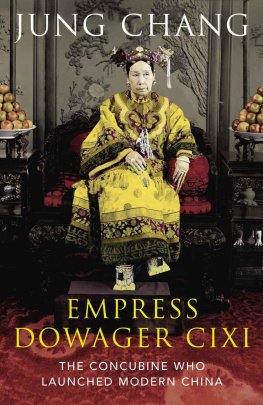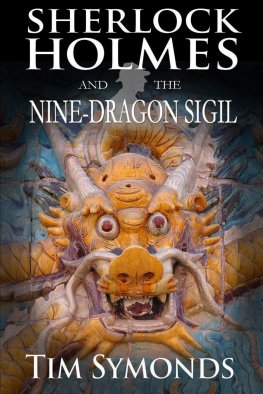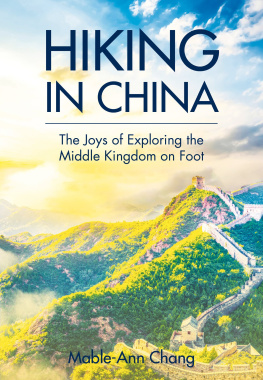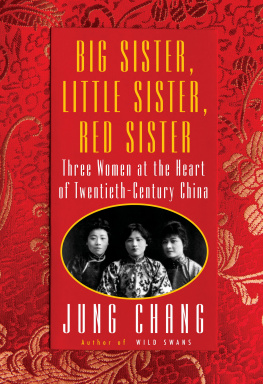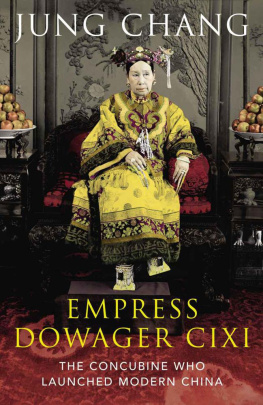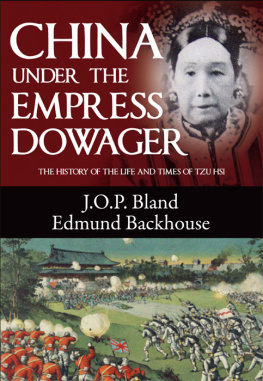Contents
About the Book
Empress Dowager Cixi (1835-1908) is the most important woman in Chinese history. She ruled China for decades and brought a medieval empire into the modern age.
At the age of sixteen, in a nationwide selection for royal consorts, Cixi was chosen as one of the Emperors numerous concubines and sexual partners. When he died in 1861, their five-year-old son succeeded to the throne. Cixi at once launched a palace coup against the regents appointed by her husband and made herself the real ruler of China behind the throne, literally, with a silk screen separating her from her officials who were all male.
In this groundbreaking biography, Jung Chang vividly describes how Cixi fought against monumental obstacles to change China. Under her the ancient country attained virtually all the attributes of a modern state: industries, railways, electricity, telegraph, and an army and navy with up-to-date weaponry. It was she who abolished gruesome punishments like death by a thousand cuts and put an end to foot-binding. She inaugurated womens liberation, and embarked on the path to introduce parliamentary elections to China. Jung Chang comprehensively overturns the conventional view of Cixi as a diehard conservative and cruel despot.
Cixi reigned during extraordinary times and had to deal with a host of major national crises: the Taiping and Boxer Rebellions, wars with France and Japan and the invasion by eight allied powers including Britain, Germany, Russia and the United States. Jung Chang not only records the Empress Dowagers conduct of domestic and foreign affairs, but also takes the reader into the depths of her splendid Summer Palace and the harem of Beijings Forbidden City, where she lived surrounded by eunuchs with one of whom she fell in love, with tragic consequences. The world Jung Chang describes here, in fascinating detail, seems almost unbelievable in its extraordinary mixture of the very old and the very new.
Based on newly available, mostly Chinese, historical documents such as court records, official and private correspondence, diaries and eye-witness accounts, this biography will revolutionise historical thinking about a crucial period in Chinas and the worlds history. Packed with drama, fast-paced and gripping, it is both a panoramic depiction of the birth of modern China and an intimate portrait of a woman: as the concubine to a monarch, as the absolute ruler of a third of the worlds population, and as a unique stateswoman.
About the Author
Jung Chang is the bestselling author of Wild Swans (1991, which the Asian Wall Street Journal called the most read book about China), and Mao: The Unknown Story (2005, with Jon Halliday), which was described by Time magazine as an atom bomb of a book. Her books have been translated into more than 40 languages and sold more than 15 million copies outside mainland China where they are both banned. She was born in China in 1952, and came to Britain in 1978. She lives in London.
Also by Jung Chang
WILD SWANS: THREE DAUGHTERS OF CHINA
MAO: THE UNKNOWN STORY
(with Jon Halliday)
List of Illustrations
About the Sources
This book is based on historical documents, chiefly Chinese. They include imperial decrees, court records, official communications, personal correspondence, diaries and eye-witness accounts. Most of them have only come to light since the death of Mao in 1976, when historians were able to resume working on the archives. Thanks to their dedicated efforts, huge numbers of files have been sorted, studied, published, some even digitalised. Earlier publications of archive materials and scholarly works have been reissued. Thus I have had the good fortune to be able to utilise a colossal documentary pool, as well as consulting the First Historical Archives of China, the main keeper of the records to do with Empress Dowager Cixi, which holds twelve million documents. The vast majority of the sources cited have never been seen or used outside the Chinese-speaking world.
The Empress Dowagers Western contemporaries left valuable diaries, letters and memoirs. Queen Victorias diary, Hansard and the copious international diplomatic exchanges are all rich mines of information. The Archives of the Freer Gallery of Art and the Arthur M. Sackler Gallery, in Washington DC, is the only place that possesses the original negatives of the photographs of Cixi.
Authors Note
The tael was the currency of China at the time. One tael weighed about 38 grams and was valued at roughly a third of a pound sterling (1 = Tls. 3).
Chinese (and Japanese) personal names are given surname first, except for those who chose to render their names differently.
The pinyin system is used where transliteration is needed. Thus there are non-pinyin Chinese names, e.g. Canton, Tsinghua (University).
The dates and ages of people are given according to the Western system (which is used in China today). The exceptions are stated.
In the Bibliography, the publication dates are of the editions which this author consulted. Many very old books may therefore give the appearance of having been published quite recently.

To Jon
Empress Dowager Cixi
The Concubine Who Launched Modern China
Jung Chang

PART ONE
The Imperial Concubine in Stormy Times (18351861)
1 Concubine to an Emperor (183556)
IN SPRING 1852, in one of the periodic nationwide selections for imperial consorts, a sixteen-year-old girl caught the eye of the emperor and was chosen as a concubine. A Chinese emperor was entitled to one empress and as many concubines as he pleased. In the court registry she was entered simply as had fought her way to become the ruler of China, and for decades until her death in 1908 would hold in her hands the fate of nearly one-third of the worlds population. She was the Empress Dowager Cixi (also spelt Tzu Hsi). This was her honorific name and means kindly and joyous.
She came from one of the oldest and most illustrious Manchu families. The Manchus were a people who originally lived in Manchuria, beyond the Great Wall to the northeast. In 1644, the Ming dynasty in China was overthrown by a peasant rebellion, and the last Ming emperor hanged himself from a tree in the back garden of his palace. The Manchus seized the opportunity to smash across the Great Wall. They defeated the peasant rebels, occupied the whole of China and set up a new dynasty called the Great Qing Great Purity. Taking over the Ming capital, Beijing, as their own, the victorious Manchus went on to build an empire three times the size of the Ming empire, at its peak occupying a territory of 13 million square kilometres compared to 9.6 million today.
The Manchu conquerors, outnumbered by the indigenous Chinese, the Han, by approximately 100:1, imposed their domination initially by brutal means. They forced the Han males to wear the Manchu mens hairstyle as the most visible badge of submission. The Han men traditionally grew their hair long and put it up in a bun, but the Manchu men shaved off an outer ring of hairs, leaving the centre part to grow and plaiting it into a trailing queue. Anyone who refused to wear the queue was summarily beheaded. In the capital, the conquerors pushed the Han out of the Inner City, to the Outer City, and separated the two ethnic groups by walls and gates. The repression lessened over the years, and the Han generally came to live a life no worse than that of the Manchus. The ethnic animosity diminished even though top jobs remained in the hands of the Manchus. Intermarriage was prohibited, which in a family-oriented society meant there was little social intercourse between the two groups. And yet the Manchus adopted much of the Han culture and political system, and their empires administration, extending to all corners of the country like a colossal octopus, was overwhelmingly manned by Han officials, who were selected from the literati by the traditional Imperial Examinations that focused on Confucian classics. Indeed, Manchu emperors themselves were educated in the Confucian way, and some became greater Confucian scholars than the best of the Han. Thus the Manchus regarded themselves as Chinese, and referred to their empire as the Chinese empire, or China, as well as the Qing.
Next page
